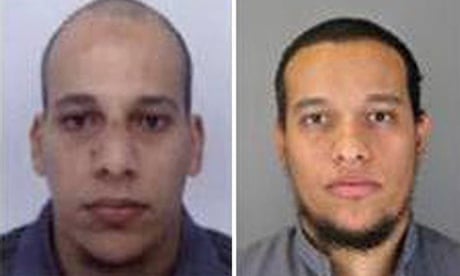A prime suspect in the attack on satirical magazine Charlie Hebdo had been imprisoned and held in a detention centre for offences connected with Islamist militancy.
Chérif Kouachi, 32, was named along with his older brother, 34-year-old Said, by French police on Wednesday night.
A third man gave himself up to authorities, but it is unclear if he was involved in any way with the attack.
The news that the younger Kouachi was sentenced in 2008 to three years in prison (with 18 months suspended) for his involvement in a network sending volunteer fighters to Iraq to fight alongside al-Qaida extremists there and was again detained after being implicated in a plot to break a jailed militant leader out of jail two years later will raise questions over why French security authorities had not been more closely monitoring his movements.
Police and intelligence services were heavily criticised in 2012 after a 23-year-old French Muslim who had recently returned from Pakistan and Afghanistan and was connected to a wider group of extremist sympathisers went on a 10-day shooting spree, killing seven people.
Kouachi would seem to be a more obvious target for surveillance by authorities, with a record of at least a decade of involvement in militant groups. His history of involvement does not indicate any link to a major established group, more a long-term activity among disorganised local networks.
An orphan of parents of Algerian origin living in the west of France, Kouachi was first jailed for his role in a notorious group known as the Buttes-Chaumont network, named after the park in north-east Paris where members did physical training. Kouachi has a technical qualification as a sports instructor.
Investigators say the alleged network funnelled about a dozen French fighters to camps linked to an al-Qaida affiliate in Iraq.
Three of the group’s members were killed in action, several more were captured there and three, including Kouachi, were arrested in France before leaving. The man accused of being the cell’s ringleader was sentenced to six years in prison.
Kouachi, who had been working as a pizza delivery driver, told the court that he had been motivated to travel to Iraq by images of atrocities committed by US troops in Abu Ghraib prison on the outskirts of Baghdad.
According to Le Monde, Kouachi was also suspected of involvement in the projected breakout from a French prison of the mastermind of a spate of 1995 bombings in France, which killed eight people.
A splinter group of an Algerian extremist organisation engaged in the violent civil war in the former French colony was blamed for those attacks.
Kouachi was held for three months under strict French anti-terror laws before being freed for lack of evidence. Investigators also believed his brother, Said, was involved in the plot.
Investigators at the time said the network was led by Djamal Beghal, a French citizen who was sent to prison for 10 years in 2005 for preparing strikes in France. Beghal had been arrested in 2001 on his return from al-Qaida training camps in Afghanistan. He said he was planning to bomb the US embassy in Paris on Osama bin Laden’s orders, interrogation documents at the time revealed.
Lawyers for Kouachi during his 2008 trial said he was not an observant Muslim, and had “smoked hash, drunk, and had a girlfriend” before becoming involved with the group. Other members of groups had been habitual petty criminals.
“Before I was a delinquent. But after I felt great. I didn’t even imagine that I could die,” he told the court.
However, as the date to leave for Iraq via Syria approached, his concerns grew, Kouachi said.
Despite his anxiety, he joined the others to train in the park. A man he met in a mosque explained the rudiments of how to handle a Kalashnikov assault rifle.
On his release from prison in 2008, Kouachi worked on the fish counter of a supermarket in the Parisian suburb of Conflans-Sainte-Honorine.
Investigators believe the weapons used in the assault may have been obtained from gangsters, possibly through connections made in prison.
